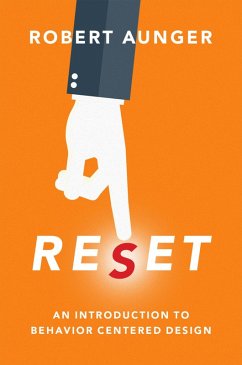Many of us would like to change one or more of our own behaviors, or those of others. Governments and public health officials frequently initiate programs to promote behavior change on a broad scale. But behavior change is difficult, and success frequently eludes us.
Reset: An Introduction to Behavior Centered Design presents a new framework for achieving behavior change that draws on recent advances in neuroscience, evolutionary biology, and ecological psychology. Behavior Centered Design provides a behavioral model derived from reinforcement learning theory, develops a fundamental taxonomy of needs based in evolutionary biology, shows how the disruption of behavior settings is key, and lays out the steps involved in programming for behavior change. Part 1 of Reset begins with an in-depth presentation of the theory behind the model - such as how BCD conceptualizes behavior change - and emphasizes the key principles of surprise, revaluation, and performance. Part 2 is a step-by-step manual for conceiving, creating, implementing, and evaluating a behavior change program. Numerous real-life examples are provided, as well as additional resources to support mastery of the BCD approach. Applied successfully to a range of public health behaviors as well as in commercial product design and marketing, the BCD approach encourages behavior change practitioners to think differently about behavior - both in understanding how and why it is produced, and in how to design programs to change it.
Dieser Download kann aus rechtlichen Gründen nur mit Rechnungsadresse in A, B, BG, CY, CZ, D, DK, EW, E, FIN, F, GR, HR, H, IRL, I, LT, L, LR, M, NL, PL, P, R, S, SLO, SK ausgeliefert werden.
Hinweis: Dieser Artikel kann nur an eine deutsche Lieferadresse ausgeliefert werden.









